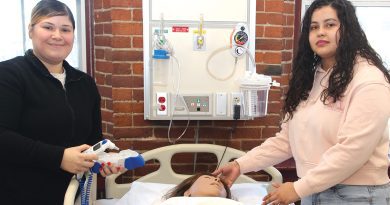Back to School
Don’t Wait — Plan Your Child’s Physical and Immunizations Now
According to Dr. J. Michael Klatte, it’s not a good idea to send your child off to college without a meningococcal B vaccination.
“Many colleges have now stepped up their efforts to require incoming students to be vaccinated against this potentially deadly bacterial infection, which last year resulted in the death of a community college student in Florida,” said Klatte, a pediatric infectious diseases specialist at Baystate Children’s Hospital.

Type B meningococcal meningitis, also known as MenB, is a bacterial infection of the linings of the brain and spinal cord (called meninges). The same bacteria can also cause an infection in the blood. For survivors, MenB can lead to permanent disabilities such as loss of limbs, irreversible brain damage, hearing loss, and scarring on the body.
“Since the meningococcal B vaccine isn’t required for everyone, you might have to specifically ask your teen’s pediatrician about getting it before he or she goes off to college. As students on college campuses are at higher risk for catching meningococcal disease, getting the shot will keep them safe from that infection,” Klatte said.
“This year’s very large measles outbreak in several areas of the country has many parents concerned,” he went on. “It is further proof that, by refusing to vaccinate, your child and those around them are then at serious risk for catching these diseases — some of which can be fatal. Time and again, vaccines have been proven to be both safe and effective, so there shouldn’t be any reasons not to vaccinate.”

The Baystate pediatrician suggested that parents should check with their child’s doctor, school or the local health department to learn about the immunization requirements in their state or county.
“Since the meningococcal B vaccine isn’t required for everyone, you might have to specifically ask your teen’s pediatrician about getting it before he or she goes off to college. “
By state law, he noted, children must be up to date on their required immunizations in order to start school. The 2019-20 immunization requirements as listed by the Massachusetts Department of Public Health (DPH) include:
• Two prior doses of measles, mumps, and rubella (MMR) vaccine for entry into any grade level ranging from kindergarten through college graduate studies (including health-science students), unless one has documented evidence of immunity to all three infections;
• Two doses of varicella (chickenpox) vaccine for entry into any grade level ranging from kindergarten through college graduate studies (including health-science students), unless one has documented evidence of immunity or a history of varicella confirmed by a physician; and
• One dose of Tdap for entry into any grade level ranging from grade 7 through college graduate studies (including health-science students).
The Tdap booster dose — recommended by the Centers for Disease Control and Prevention (CDC) or preteens at ages 11 or 12 — provides protection against tetanus, diphtheria, and pertussis (whooping cough). Children initially receive protection against these bacteria with the DTaP vaccine, which loses its protective effectiveness over time. As a result, preteens and teens need to get a Tdap booster dose. This is important to protect not only them, but also those around them — especially babies and the elderly.
According to the CDC, all preteens 11 or 12 years old need one dose of Tdap vaccine, one dose of meningococcal vaccine (to help prevent against bacterial meningitis due to meningococcal types A, C, W and Y), and two doses of HPV vaccine (for those who get their first dose of HPV vaccine between ages 9 and 14) to be fully protected against these serious diseases. A second dose of meningococcal vaccine is also necessary at age 16. The state DPH (via the Massachusetts HPV Initiative) and the CDC continue to urge healthcare professionals to give a strong recommendation for all the adolescent vaccines recommended for boys and girls ages 11 or 12 years, and to recommend the HPV vaccine as they would Tdap and meningococcal vaccines. Vaccination schedules are available online at www.aap.org/immunization and www.cdc.gov/vaccines/schedules.
When it comes to back-to-school physicals, Dr. John O’Reilly of Baystate Children’s Hospital agrees with the American Academy of Pediatrics that “back to school means back to the doctor.”
“A good student is a healthy student. Since the American Academy of Pediatrics recommends yearly well visits for children starting at age 3 through 18, scheduling a back-to-school physical each year is a good way to meet that goal,” he added.
O’Reilly, who is also chief of Baystate General Pediatrics, said the time is running out to schedule those back-to-school check-ups and sports physicals as pediatrician offices face an influx of calls to schedule appointments and get the proper paperwork completed before the school year begins.
“As pediatricians, we want to partner with parents to help their children be successful students,” he said. “Are they generally healthy? Will they have any problem seeing the board? Is their hearing OK, so they don’t miss what the teacher is saying? Do they have any attention issues? We want to address all these issues before they enter the classroom.”
Also, “if your child has asthma or a peanut allergy, or any other chronic condition, we will need to develop an action plan to share with the school nurse,” O’Reilly noted. “Paperwork must also be completed for any prescription medications your child may need to take while at school.”




